The regional partners have agreed to enhance maritime activities in the South China Sea amid mounting concerns over “destabilising and coercive unilateral actions”, which threaten to “alter the status quo”, Defence Minister Linda Reynolds has revealed.
To continue reading the rest of this article, please log in.
Create free account to get unlimited news articles and more!
Australian Minister for Defence Linda Reynolds met with Japan’s newly appointed Minister of Defense Kishi Nobuo in Tokyo on Monday (19 October) to discuss the nations’ ongoing commitment to building close bilateral defence and security ties in the Indo-Pacific, as part of the Japan-Australia Special Strategic Partnership.
According to the Department of Defence, the ministers acknowledged the strategic benefits of bilateral defence and security co-operation, including training exercises, defence science and technology, and defence industry co-operation, as well as co-ordination on regional issues of shared interest.
Among the issues raised, was the continued response to the COVID-19 pandemic, with the ministers committing to working closely with partners to support regional recovery and security.
However, the discussion centred on developments in the East China Sea, the South China Sea and North Korea.
“The ministers reinforced their strong opposition to any destabilising or coercive unilateral actions that could alter the status quo and increase tensions in the East China Sea,” Defence noted in a statement.
“They expressed their intention to continue to coordinate closely on the security environment in this region.
“The ministers reinforced their strong opposition to any attempts to unilaterally change the status quo by coercion in the South China Sea, and reaffirmed the importance of upholding freedom of navigation and overflight.”
According to Defence, the ministers reaffirmed “serious concern” about recent incidents in the region, including the continued militarisation of disputed features, dangerous or coercive use of coast guard vessels and “maritime militia”, and efforts to disrupt resource exploitation activities.
“They emphasised the importance of peaceful resolution of disputes in accordance with international law, including the United Nations Convention on the Law of the Sea (UNCLOS),” Defence added.
Concerns were also expressed over North Korea’s repeated violation of multiple United Nations Security Council Resolutions (UNSCRs), including launches of short-range ballistic missiles.
The ministers renewed calls for the “complete, verifiable and irreversible dismantlement” of all of North Korea’s nuclear weapons, other weapons of mass destruction and ballistic missiles of all ranges.
Ministers Reynolds and Kishi noted shared efforts to “deter, disrupt, and ultimately eliminate” the evasion of sanctions by North Korea, including illicit ship-to-ship transfers and direct shipments of sanctioned goods.
In accordance with concerns raised during their meeting, the ministers agreed to forge deeper relations across a range of defence and security interests by:
- enhancing regular bilateral and multilateral co-operative activities in the Indo-Pacific, including maritime activities in the South China Sea;
- strengthening interoperability between the Japan Self-Defense Forces and the Australian Defence Force through increasing the complexity and sophistication of bilateral exercises and operations, including testing of air-to-air refuelling;
- continuing to enhance the mutual understanding between the Japan Self-Defense Forces and the Australian Defence Force through people-to-people exchanges, including placement of the Australian Liaison Officer at the Japan Ground Self-Defense Force;
- driving bilateral space and cyber co-operation in areas of mutual benefit;
- deepening defence science and technology collaboration, including new possible joint research in the areas of hydroacoustics and ground vehicle autonomy; and
- growing industry-to-industry engagement to support capability for our respective defence forces.
The ministers also agreed to continue to exchange views to promote regional peace and security, including by:
- sharing lessons learned from HA/DR operations during the COVID-19 pandemic;
- exploring new opportunities for capacity building with like-minded partners to build regional resilience;
- sharing information and exchanging views on reinforcing the rules-based international order, including working together to counter disinformation in the context of the COVID-19 pandemic.
In addition, the ministers have instructed military officials to commence necessary co-ordination to create a framework to protect ADF assets under Article 95-2 of the SDF Law, and noted the importance of finalising a reciprocal access agreement.
The nations also reaffirmed their commitments to working with other regional parts, including the Pacific island countries in the fields of capacity building, maritime security, and humanitarian assistance and disaster relief, particularly under the Boe Declaration on Regional Security.
“The ministers recognised that Japan and Australia would continue to coordinate closely in defence-related fora, including through their respective involvement in the Japan Pacific Islands Defense Dialogue (JPIDD) and the South Pacific Defence Ministers’ Meeting (SPDMM) and other relevant regional dialogues,” Defence concluded.
[Related: Defence to ‘advance’ bilateral ties in Indo-Pacific]

 Login
Login







